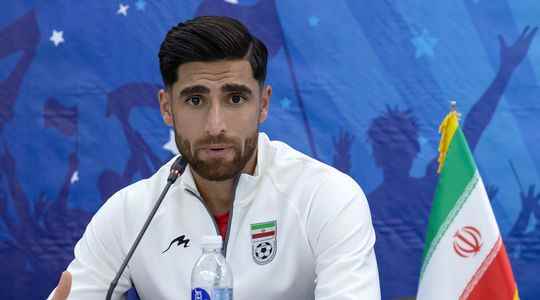The Football World Cup gives the mullahs cold sweats. More than the angry cries of supporters, the Iranian regime fears silence. That of the players during the national anthem or after a goal, a brilliant sign of support for the demonstrators who, for more than two months, have challenged the Islamic Republic.
Since the death of Mahsa Amini, killed by the morality police for a poorly put on veil, protesters have been able to count, behind the scenes and on social networks, on the support of footballers, true icons in Iran. “As in Brazil, the Iranians have a devouring passion for football and their national team, underlines Thierry Coville, researcher at the Institute of International and Strategic Relations and author of Iran, a power on the move (Eyrolles, June 2022). When big stars of Iranian football like former player Ali Karimi, the equivalent of Zinédine Zidane in France, place themselves at the forefront of the dispute, it annoys the regime enormously.” Like other Iranian glories, Karimi is prosecuted in justice for having denounced the violence of the authorities.
Even Team Melli players are protesting
Like society, it is all Iranian football that is booming. In recent weeks, the championship matches have been played without spectators, for fear of contagion of the revolt in the stands. On the field, the players are careful not to celebrate their goals or their victories, a way of paying tribute to the victims of repression.
Team Melli, the national team competing in the World Cup in Qatar, finds itself at the heart of the storm. Its star striker, Sardar Azmoun, split a devastating message on social networks: “At worst, they dismiss me from the national team. It’s not a problem, I can make this sacrifice in exchange by a hair that sticks out of the heads of the Iranian women… Shame on you for killing so easily. Long live the Iranian women!” The player, who plays in Germany, was finally called up for the World Cup, despite political pressure against him.
The behavior of Iranian players will be all the more scrutinized as they will face, on November 29, the United States, enemy number one of the regime. “Today, anti-American slogans are only supported by the hardliners of the regime, the vast majority of Iranians hope for normal relations with the rest of the world, points out Thierry Coville. Huge popular pressure is mounting in Iran for players to show what they think, that they act in favor of the protesters.”
The situation worries Qatar to the highest degree. Unaccustomed to demonstrations, the authorities fear overflows outside and inside the stadiums. “Iran is the most delicate case for Qatar to manage, believes Gerd Nonneman, professor at Georgetown University in Doha. The profile of Iranian supporters – are they pro or anti-regime? – remains a big unknown. Qatar, which wants to maintain a good relationship with the Iranian government, may feel compelled to intervene in the event of overly visible protests.” In front of cameras around the world, the Iranian uprising would then take on a whole new dimension.
